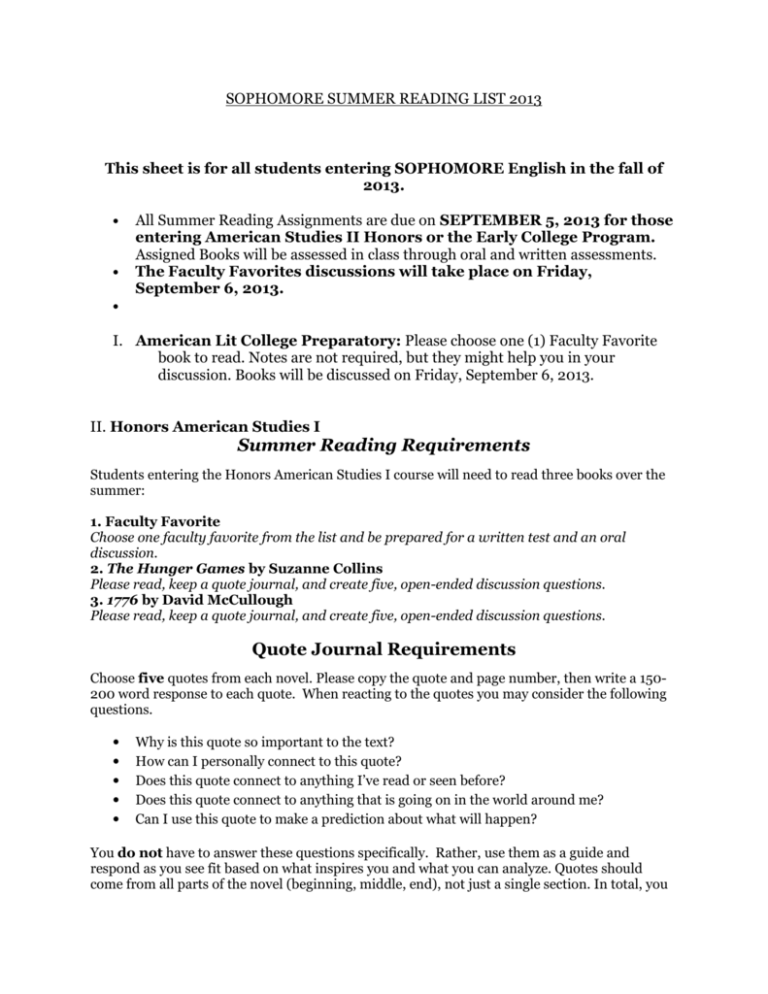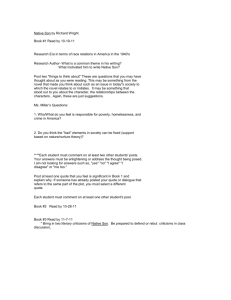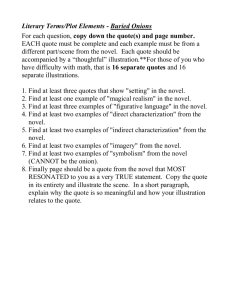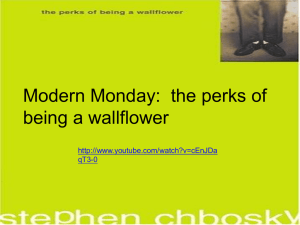Summer Reading Requirements Quote Journal Requirements
advertisement

SOPHOMORE SUMMER READING LIST 2013 This sheet is for all students entering SOPHOMORE English in the fall of 2013. • • All Summer Reading Assignments are due on SEPTEMBER 5, 2013 for those entering American Studies II Honors or the Early College Program. Assigned Books will be assessed in class through oral and written assessments. The Faculty Favorites discussions will take place on Friday, September 6, 2013. • I. American Lit College Preparatory: Please choose one (1) Faculty Favorite book to read. Notes are not required, but they might help you in your discussion. Books will be discussed on Friday, September 6, 2013. II. Honors American Studies I Summer Reading Requirements Students entering the Honors American Studies I course will need to read three books over the summer: 1. Faculty Favorite Choose one faculty favorite from the list and be prepared for a written test and an oral discussion. 2. The Hunger Games by Suzanne Collins Please read, keep a quote journal, and create five, open-ended discussion questions. 3. 1776 by David McCullough Please read, keep a quote journal, and create five, open-ended discussion questions. Quote Journal Requirements Choose five quotes from each novel. Please copy the quote and page number, then write a 150200 word response to each quote. When reacting to the quotes you may consider the following questions. • • • • • Why is this quote so important to the text? How can I personally connect to this quote? Does this quote connect to anything I’ve read or seen before? Does this quote connect to anything that is going on in the world around me? Can I use this quote to make a prediction about what will happen? You do not have to answer these questions specifically. Rather, use them as a guide and respond as you see fit based on what inspires you and what you can analyze. Quotes should come from all parts of the novel (beginning, middle, end), not just a single section. In total, you will have two quote journals (one for The Hunger Games and one for 1776) with five quotes each. Journals should be typed and double-spaced and meet the length requirement. Discussion Question Requirements Create five open-ended questions about each novel. These questions should be interesting and should engage your classmates in discussion. The questions should challenge your classmates to think in more depth about the novel. These are question starters that you may want to use for inspiration. • • • • How would you solve this problem in your life? What was important about…? What is the message…? Do you feel ____ is ethical or not? Why or why not? These words are associated with questions that call for higher-level thinking: • Analyze • Synthesize • Judge • Evaluate • Apply Honors American Studies I Summer Reading Rubric: Quote Journal and Discussion Questions Objective s Academi c 3: Communic ates effectively in written form Academi c 4: Access, comprehe nd, analyze and interpret informatio n Require ments Quotes Question s Exemplary Writing consistently includes thoughtful ideas and is developed logically. Demonstrates excellent command of conventions of the written language. Writing is well organized and contains rich vocabulary. Consistently demonstrates appropriate strategies for accessing, comprehending, analyzing, and applying information from the novel. Criteria Proficient Needs Improvement Writing includes Writing is relevant. thoughtful ideas. Conventions of the Demonstrates control written language have of conventions of the many errors. Writing written language. shows limited Writing is well organization. organized. Deficient Writing is irrelevant, disorganized. Information is limited and mainly inaccurate. Errors hinder understanding. Generally demonstrates appropriate strategies for accessing, comprehending, analyzing, and applying information from the novel. Inconsistently demonstrates appropriate strategies for accessing, comprehending, analyzing, and applying information from the novel. Seldom demonstrates appropriate strategies for accessing, comprehending, analyzing, and applying information from the novel. All requirements are met. Most requirements are met. Some requirements are met. Few requirements are met. Quotes are wellselected and demonstrate a keen understanding the novel. Their analysis and discussion are poignant and insightful. Questions are strong and interesting. The show a deep understanding of the novel and require higher-level thinking to answer. Quotes are appropriately selected and demonstrate an understanding the novel. They are adequately discussed and analyzed. Quotes may not all be well-selected. The analysis and discussion may be superficial and/or show gaps in understanding. Quotes are not wellselected and are not analyzed or discussed in a way that demonstrates an understanding of the novel. Questions are appropriate. They show an understanding of the novel and are openended. Some questions may be basic in their creation and may not require higher-level thinking to answer. Some may not be open-ended. They may show gaps in understanding of the novel. Questions are not wellcrafted, are not open, ended and do not demonstrate an understanding of the novel. **NOTE: Plagiarism or cheating of any kind will result in a zero on the assignment. 10 points will be deducted for each day the assignment is late. TOTAL:_________/20 Comments: Quote journals and questions for The Hunger Games and 1776 novel all due on the first day of school and will count as a test grade. Sophomore Early College (Class of 2016): A total of 2 books 1. Pick a faculty favorite (tentative date for test: Thursday, September 5) 2. Brave Companions: Portraits in History McCullough, David. Brave Companions: Portraits in History. New York: Simon & Schuster Paperbacks, 1992. Print. Test Date (short essay and Roundtable Discussion): Tentatively scheduled: Tuesday, September 10 Description: From School Library Journal “McCullough’s collection of fascinating mini-biographies is a sheer delight, and will hold the attention of many history and science students. In this compilation of over 20 years of his shorter essays, the author chose individuals who are distinctive for their contributions to culture. The 17 biographies highlight the field of social work, science, architecture, literature, and history, all of which are interconnected in memorable ways. The work maintains strong reader interest because of an intelligent, practiced, precise style combined with a wise and rich choice of subject. Familiar figures such as Harriet Beecher Stowe and Teddy Roosevelt share space with lesser-known individuals—but all are people who merit admiration” (School Library Journal).







